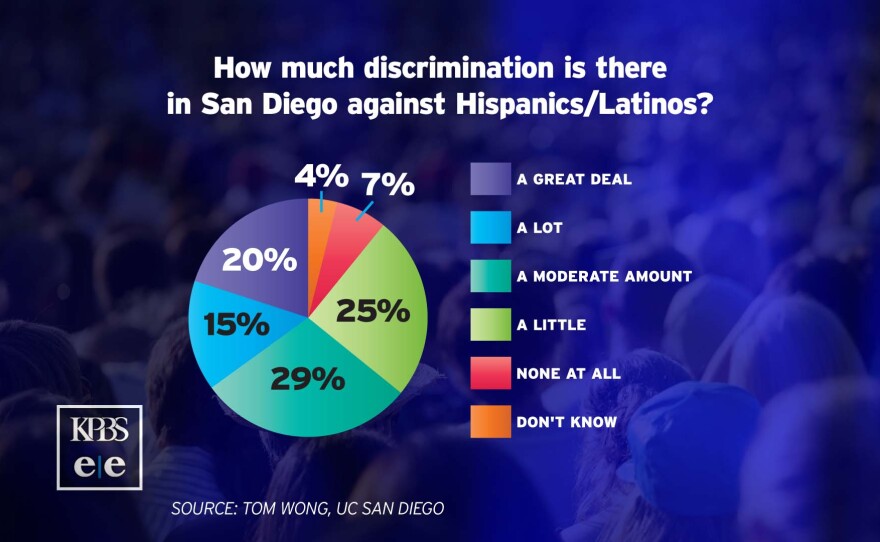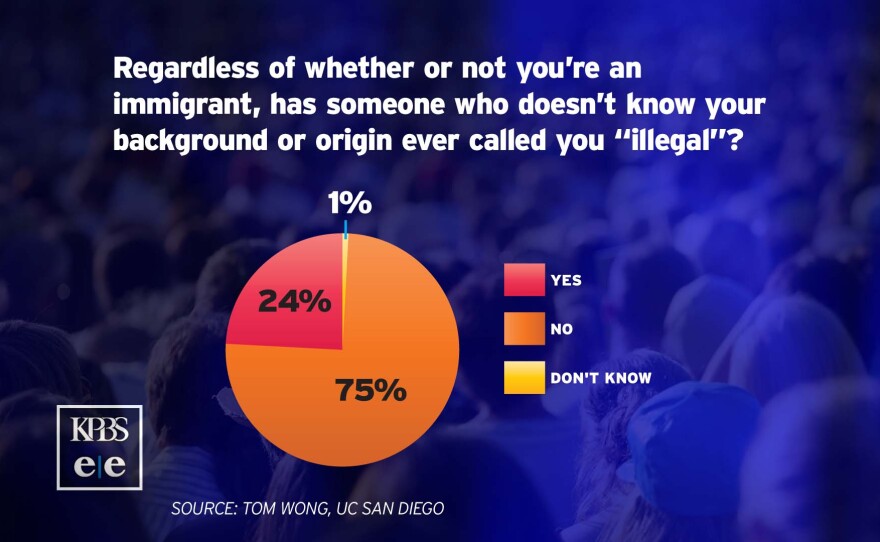San Diego celebrates its Hispanic roots through food, music and tourist attractions like Old Town, the city’s original settlement when this was still Mexico. But a recent survey commissioned by KPBS and San Diego Magazine finds that the people who gave us this cultural legacy face discrimination today.
Four hundred Latinos in San Diego County took the survey by phone earlier this year. And more than one in three said there was “a lot” or “a great deal” of discrimination against Latinos here.
And there were other results that caught the attention of Tom Wong, the UC San Diego political scientist who designed the survey.
One of the survey questions asked Latino respondents to use three words to describe the average Latino.
“We hear things like 'good,' 'kind,' 'caring,' 'hardworking,'" Wong said.
In fact, “hardworking” was by far the most popular response.
Then respondents were asked how they thought the average San Diegan would describe Latinos or Hispanics. And again, “hardworking” was the top response, followed by “good.”
“But some nasty words also came up," Wong said. "Like ‘uneducated,’ ‘lazy’ and some very hurtful words.”
Plus, stereotypes like “Immigrant,” “Mexican” and “illegal” were among the top 10 answers Latinos gave to the question of how they felt Latinos were perceived by the larger San Diego population. And many survey respondents said they had real experiences with these stereotypes.
One in four respondents said he or she had been called “illegal” at some point by someone who knew nothing about the respondent's background or immigration status.
Out in the community, it’s not hard to find Latinos with stories to tell.
On a recent weekend afternoon, Maria Mora was waiting for a client at the hair salon she owns in Normal Heights. Mora was born in Guadalajara, Mexico but has lived in San Diego for 22 years.

Mora said she didn’t feel welcome when she first came to San Diego. She recalled an incident where a guy in an elevator asked her if she had a green card.
“I said, ‘excuse me? Are you an immigration official?’” Mora recalled. The man said “no.”
“Then why are you asking?’” Mora asked him.
She said there have been other, similar incidents.
At a recent meeting of the North County Association of Latino Merchants in Escondido, Manny Alvarez played guitar as members ate breakfast and chatted in English and Spanish.
Bill de la Fuente called the meeting to order.
“Good morning everyone. Buenos días a todos. Manny Alvarez came all the way up here from Imperial Beach. He passed all the checkpoints and everything just fine,” he joked.
Everyone laughed.
“That’s sometimes how you gotta deal with hard situations like that,” de la Fuente said after the meeting. “You gotta joke about them a little bit.”

Asked if he personally had felt discrimination for being Latino, de la Fuente said “not since my hair turned grey.”
De la Fuente said he had felt some discrimination way back when he was a kid in San Francisco. But a few minutes later, he remembered something more recent, when he was starting a bank in Escondido in 1999 that would cater to Latino customers.
“When I showed up to open up the bank, the first day, our opening, we found swastikas, you know, ‘Mexicans go home,’ just a bunch of terrible things right there,” he said.
Many Latinos said they faced less discrimination today than in the past, but that it's still a problem.
Despite this, many in the survey said they don’t let prejudice get to them.
“I’m the type of individual that I feel very confident in myself,” said Oscar Paz, a realtor in Escondido. “I enter any door and I don’t pay attention to see if I’m going to be received with open arms or not.”
Even if some people can brush it off, Tom Wong, the political scientist, said San Diego needed to start talking openly about discrimination, prejudice and segregation.
“We as individuals play a role in building the type of community that we may want, if that community we want is a more diverse and integrated place,” Wong said. “I don’t see how we can improve those things unless we first acknowledge that they exist.”
Wong said he and his team plan to expand the survey to other racial and ethnic groups in San Diego.






